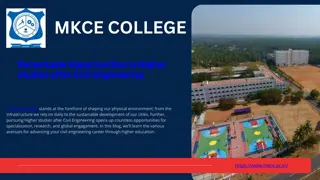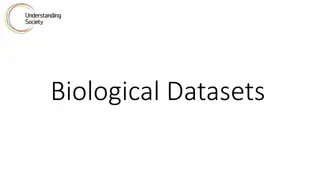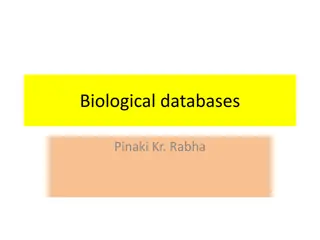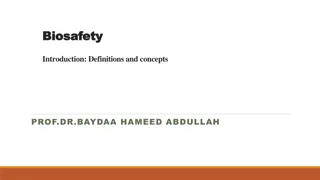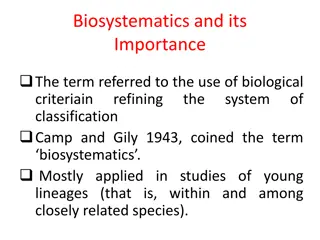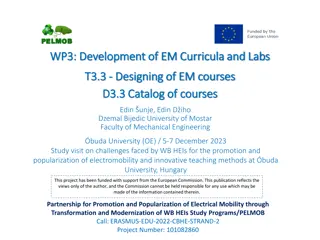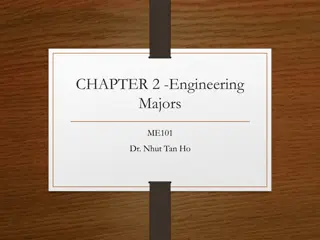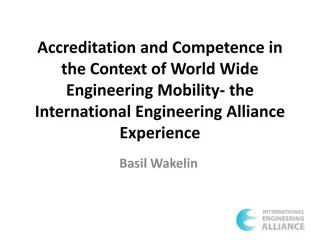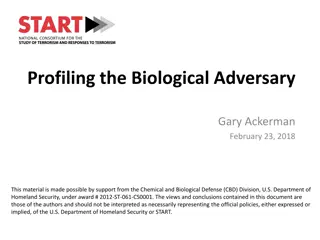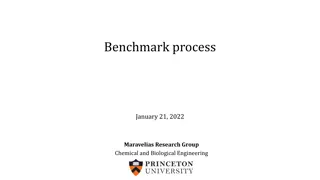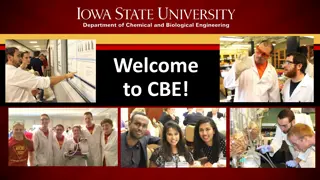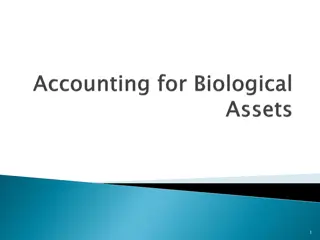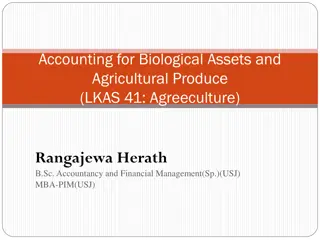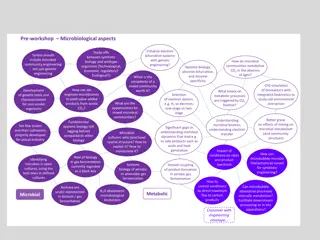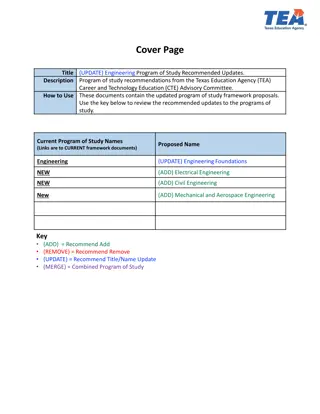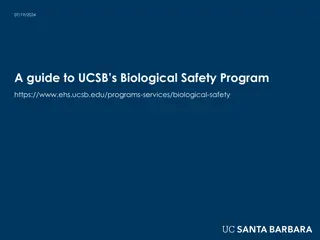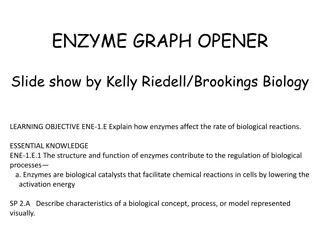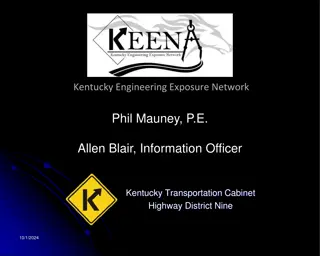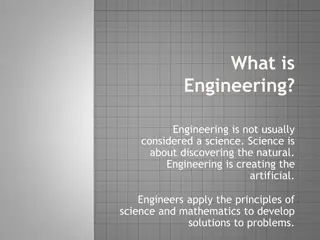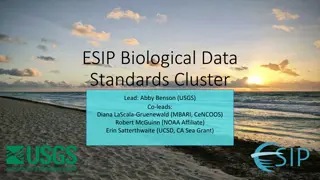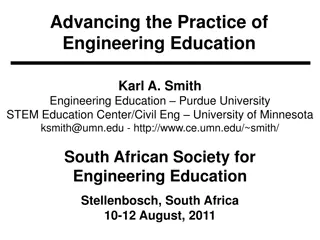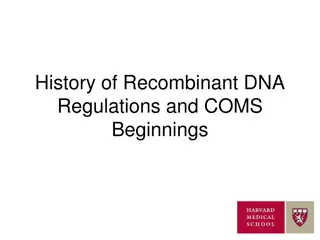Introduction to Engineering with ABET, Inc.
Explore the world of engineering with ABET, Inc. Introduce students to accredited schools in West Virginia and different branches of engineering. Learn about essential questions, career opportunities, and the inspiring history of engineering achievements. Discover the difference between engineering
1 views • 19 slides
Explore Agricultural and Biological Engineering (ABE) Programs at Purdue University
Discover the academic programs and valuable resources offered by the Agricultural and Biological Engineering (ABE) department at Purdue University. Meet the dedicated staff members, review degree options, and learn about upcoming events and registration processes. Explore opportunities in fields suc
2 views • 16 slides
Ask On Data A Chat Based Data Engineering Tool
In the field of data engineering, accuracy and efficiency are critical. Conventional methods frequently include laborious procedures and intricate interfaces. However, with the rise of chat based data engineering tool such as Ask On Data, a new era of data engineering is beginning. These cutting-edg
2 views • 2 slides
Remarkable Opportunities in Higher studies after Civil Engineering
Higher studies after Civil Engineering in Tamil Nadu\nCivil engineering stands at the forefront of shaping our physical environment; from the infrastructure we rely on daily to the sustainable development of our cities. Further, pursuing Higher studies after Civil Engineering opens up countless oppo
0 views • 2 slides
Understanding Diverse Classes of Lipids in Biological Systems
Sphingolipids and waxes are important classes of lipids found in biological membranes, each with unique structures and functions. Sphingolipids, including sphingomyelins and glycosphingolipids, play crucial roles in nerve transmission, cell recognition, and tissue immunity. Waxes, on the other hand,
3 views • 4 slides
Introduction to Synthetic Biology: Understanding the Core Concepts and Applications
In this introductory lecture on synthetic biology, you will explore the fundamental principles of engineering biology, including the design and construction of new biological entities. The focus is on leveraging molecular, cell, and systems biology advancements to create biological systems that can
0 views • 89 slides
Biological Hazards in the Hospital Community
Healthcare workers face various occupational hazards, including biological risks, in hospital settings. This article by Ephraim E. Ibadin explores the definition, types, risk factors, sources, prevention, and control of biological hazards in hospitals, emphasizing the importance of protecting worker
0 views • 30 slides
System Engineering Division Monthly Meeting - June 23, 2022
The System Engineering Division Monthly Meeting held on June 23, 2022, featured discussions on Digital Engineering Metrics Framework, Conference Updates, Systems Engineering Research Center, NDIA SED Committee Updates, SoS/ME Committee Report, and Mission Engineering Initiative Updates. The meeting
0 views • 26 slides
Understanding Biological Datasets and Omics Approaches in Disease Research
Explore the world of biological datasets, lipidomics, genomics, epigenomics, proteomics, and the application of omics in studying biological mechanisms, predicting outcomes, and identifying important variables. Dive into DNA, gene expression, methylation, and genetic datasets to unravel the complexi
0 views • 34 slides
Overview of Lipids: Classification and Biological Importance
Lipids are organic substances that play a crucial role in biological systems. They include simple lipids, complex lipids like phospholipids and glycolipids, and derived lipids. Simple lipids are esters of fatty acids with various alcohols, while complex lipids are sub-classified based on the type of
2 views • 38 slides
An Overview of Biological Databases in Bioinformatics
Biological databases play a crucial role in bioinformatics, storing vast amounts of data related to nucleotide sequences, protein sequences, and more. These databases are publicly accessible and essential for research in biological fields. Primary databases, such as GenBank, EMBL, and DDBJ, contain
0 views • 13 slides
Understanding Biosafety and Biosecurity Principles
Biosafety and Biosecurity are essential concepts in safeguarding against biological hazards. This article explores the definitions of hazard, threat, and risk, emphasizing the importance of managing risks associated with biological materials through biosafety and biosecurity measures. Learn about th
0 views • 26 slides
Understanding Chemical Groups and Macromolecules in Biological Processes
In biological processes, certain chemical groups play crucial roles in molecular functions. These functional groups, including hydroxyl, carbonyl, carboxyl, amino, sulfhydryl, phosphate, and methyl, are essential for the structure and function of biological molecules. Additionally, macromolecules, s
0 views • 9 slides
Trickling Filter: A Sustainable Wastewater Treatment Solution
The trickling filter is a biological treatment process utilizing a solid media where bacteria accumulate to maintain high populations. Bacteria growth occurs on the media surface with oxygen provided by air diffusion. As bacteria metabolize waste, they reproduce, creating a biological layer. Filter
5 views • 26 slides
Understanding Biosystematics and Its Significance in Biological Classification
Biosystematics plays a crucial role in refining biological classification by focusing on biological criteria to define relationships within closely related species. It helps delineate biotic communities, recognize different biosystematic categories, and understand evolutionary patterns. Through the
0 views • 15 slides
Development of Electromobility Curriculum at Dzemal Bijedic University
Edin D.iho Dzemal Bijedic University at Mostar is actively involved in the promotion and modernization of electromobility through the development of innovative teaching methods and curricula. This project, funded by the European Commission under the PELMOB initiative, focuses on designing electromob
0 views • 19 slides
Introduction to Mechanical Engineering: Exploring Career Opportunities and Roles
This content delves into the world of mechanical engineering, covering topics such as the characteristics of students interested in engineering, the distinction between engineers and scientists, and the functions of engineers in research. It also provides insights into the differences between engine
5 views • 41 slides
Evolution of Engineering: From Ancient Innovations to Modern Paradigms
Explore the rich history of engineering from ancient times to the modern industrial revolution. Delve into the origins of the word "engineering," ancient inventions, the beginnings of engineering education in various countries, the paradigm of engineering, and the different types of engineers. Disco
0 views • 64 slides
International Engineering Alliance Experience: Accreditation & Competence
This article explores the International Engineering Alliance's educational accords and mobility agreements, emphasizing the importance of global recognition and adoption of engineering education standards. It discusses the definition of engineering, the characteristics of a profession, and the crite
1 views • 18 slides
Understanding Biological Adversaries: Education Levels and Demographics
Exploring the traits of biological adversaries, this study reveals that perpetrators with higher education levels are more likely to successfully use chemical and biological agents. Success tends to increase with age and years of activity. Most individual perpetrators originate from the MENA region,
0 views • 16 slides
Benchmark Process in Chemical and Biological Engineering Research Group
The benchmark process conducted by the Maravelias Research Group in Chemical and Biological Engineering focuses on wastewater treatment efficiency and performance metrics. The process includes various stages such as secondary treatment, preliminary treatment, primary treatment, disinfection, and bio
0 views • 7 slides
Exploring the Department of Chemical and Biological Engineering at CBE
Discover the Department of Chemical and Biological Engineering at CBE through key statistics, achievements, rankings, leadership, and faculty overview. Dive into a thriving academic environment with a focus on student diversity, scholastic excellence, and esteemed faculty members shaping the future
0 views • 28 slides
Accounting for Biological Assets and Agricultural Produce
At the end of this lesson, you will be able to identify the principal issues in accounting for biological assets and agricultural produce at the time of harvest. Topics include the recognition, measurement, presentation, and disclosure of biological assets in financial statements. Questions regardin
0 views • 26 slides
Accounting for Biological Assets and Agricultural Produce (LKAS 41: Agriculture) by Rangajewa Herath
This content provides insights into the accounting standards for biological assets and agricultural produce under LKAS 41, discussing classification, presentation, measurement, gain or loss recognition, and disclosure requirements. It covers the unique nature of biological assets, the scope of LKAS
0 views • 20 slides
Understanding Workplace Safety Hazards: Physical, Chemical, and Biological Risks
Explore the three main types of workplace safety hazards - physical, chemical, and biological - with a focus on identifying potential risks and ensuring a safe work environment. Learn about common hazards such as repetitive motion, chemical exposure, and handling biological materials, essential for
0 views • 97 slides
Reexamining the Biological Race Debate by Quayshawn Spencer
Quayshawn Spencer reexamines the biological race debate, discussing the onto-semantic strategy, its problems, and applications to public health genomics. The philosophical foundations of biological racial anti-realism are critiqued, exploring the concept of race through historical perspectives like
0 views • 37 slides
Advancing Microbiological Systems Through Genetic Engineering and Microbial Community Engineering
Exploring the intersection of genetic engineering and microbial community engineering to enhance electron bifurcation systems. Addressing trade-offs between synthetic biology and wildtype organisms, incorporating microbial community engineering in Synbio, and investigating CO2 metabolism in the abse
0 views • 8 slides
Recommended Updates for Engineering Program of Study
The Engineering Program of Study recommendations from the Texas Education Agency (TEA) Career and Technology Education (CTE) Advisory Committee include updates to various fields such as Electrical Engineering, Civil Engineering, and Mechanical and Aerospace Engineering. The proposed program framewor
0 views • 5 slides
Biology Integration Institutes (BII) - NSF Research Opportunity
Supporting collaborative teams of researchers exploring overarching biological themes, the Biology Integration Institutes (BII) provide a framework for integrated research in diverse biological disciplines. This initiative enables design and development activities, with potential for significant fun
0 views • 10 slides
Guide to UCSB Biological Safety Program
This guide provides an overview of UCSB's Biological Safety Program, covering important aspects such as lab safety fundamentals, biological use authorization, biosafety officer's role, and the Institutional Biosafety Committee. It outlines key steps like hazard assessment, training, waste management
0 views • 24 slides
Enzymes in Biological Reactions: Understanding Activation Energy
Enzymes, as biological catalysts, play a crucial role in regulating biological processes by lowering the activation energy required for chemical reactions in cells. The addition of enzymes changes the overall energy dynamics of reactions, impacting the rate at which products are formed. This interac
0 views • 7 slides
Engineering Ethics in Practice: A Guide for Engineers by Prof. Dr. Halit Hami Z. - Insights and Reflections
The book "Engineering Ethics in Practice: A Guide for Engineers" by Prof. Dr. Halit Hami Z. from Kafkas University provides insights on a range of ethical issues faced by engineers. Through case studies, it highlights the importance of addressing ethics in engineering work and offers guidance on nav
0 views • 54 slides
Explore the World of Engineering with Kentucky Engineering Exposure Network
Delve into the diverse field of engineering with the Kentucky Engineering Exposure Network (KEEN). Discover the various types of engineering specialties, the role of engineers in society, and the steps to pursue a career in this dynamic profession. Get insights into civil, structural, geotechnical,
0 views • 52 slides
Exploring the World of Engineering: Types and Applications
Engineering is a creative process that involves applying scientific and mathematical principles to develop solutions. This article delves into the different branches of engineering - Chemical, Civil, Electrical, and Mechanical - showcasing the diverse applications of each field. From discovering pla
0 views • 12 slides
Guidelines and Regulations for Science and Engineering Fair Projects
Ensure completeness of required forms before conducting any experimentation for the Collier Regional Science and Engineering Fair. Local rules take precedence over state and international rules. Projects involving vertebrate animals, hazardous biological agents, or chemicals require approval from th
0 views • 13 slides
System Engineering Division Monthly Meeting Summary - May 26, 2022
The System Engineering Division Monthly Meeting on May 26, 2022, featured discussions on USD Research & Engineering, Mission Engineering Initiatives, Digital Systems Engineering, Committee Reports, and Updates. Presenters included key figures such as Holly Dunlap, Marc Goldenberg, Dr. Judith Dahmann
0 views • 51 slides
Engineering Freshmen's Journey at UF - Spring 2016
Raj Shah, Nicholas Poindexter, Andrew Kurland, and Trevor Ross, freshmen students at UF in different engineering disciplines, shared their experiences and aspirations. Raj in Computer Hardware Engineering, Nick in Electrical Engineering, Andrew in Mechanical Engineering, and Trevor in Industrial and
0 views • 9 slides
Advancing Biological Data Standards for Marine Research
Discussion on biological data standards for marine research, challenges faced, existing standards, and the need for guidance and community building. Goals include maximizing data relevance for biodiversity studies. Ongoing work involves developing a primer for data managers unfamiliar with biologica
0 views • 7 slides
Advancing Engineering Education: Embracing Innovation and Research
Karl A. Smith, from Purdue University, discusses advancing the practice of engineering education through innovative practices, research, and embracing engineering principles. The focus is on cultivating a loop between research and practice while exploring Rigorous Research in Engineering Education (
0 views • 54 slides
Understanding COMS and Recombinant DNA Regulations
The Committee on Microbiological Safety (COMS) was established in 1978 to address public concerns regarding safety, environment, and ethics of research involving hazardous biological agents. COMS oversees activities related to recombinant DNA and biological agents at Harvard, supporting all schools
0 views • 6 slides



